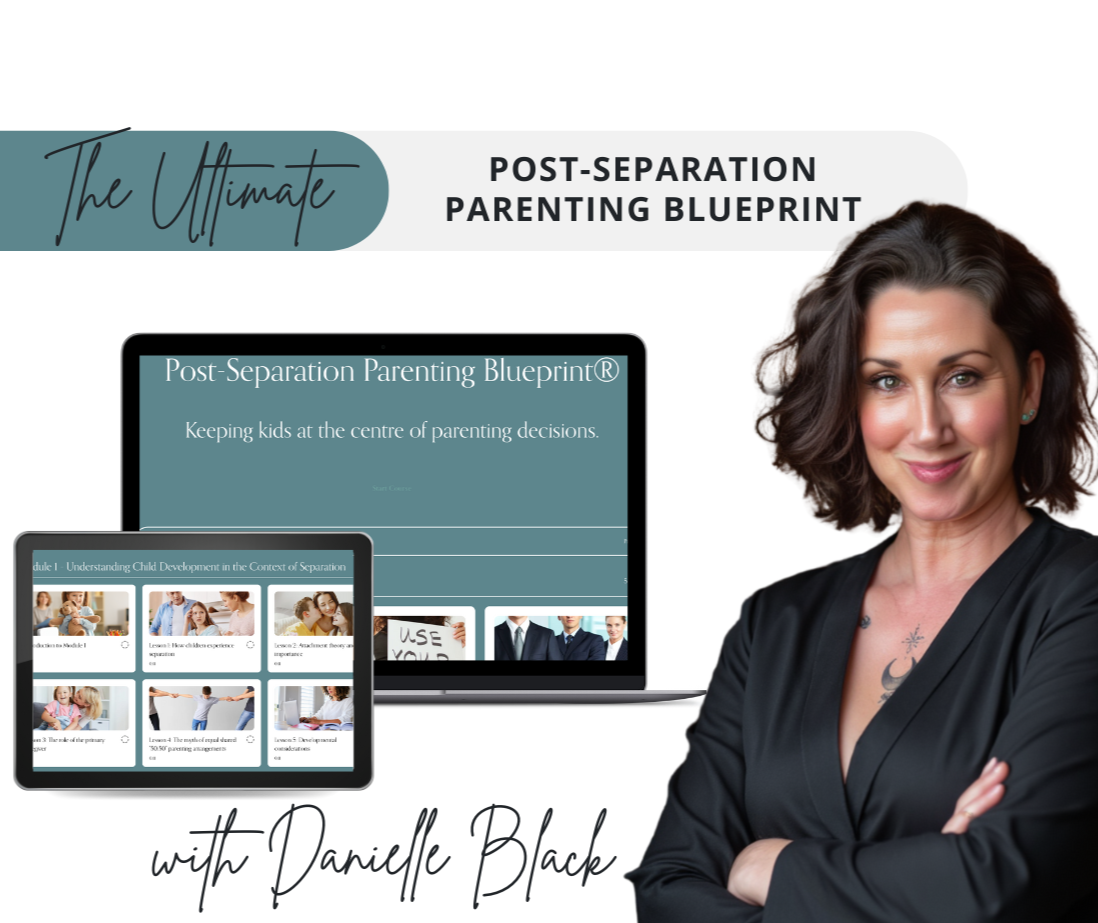Post-Separation Parenting:
Expert guidance that puts children first
You know something doesn't feel right...
When your former partner has insisted on “50/50” - telling you that it’s ‘fair’ - but your kids return home dysregulated after every transition.
When you’re told to “just communicate better” with a former partner who exhibited controlling behaviours during your relationship.
When well-meaning mediators or lawyers push for “fairness” between adults - whilst completely ignoring what's developmentally appropriate for your 2-year-old versus your 12-year-old.
Here's what they don't tell you: Most post-separation parenting advice ignores child development research entirely.
The problem: Generic advice for complex situations
Many professionals in the family law space operate on outdated assumptions about what children need after separation.
This means that parents are often left prioritising adult concepts of “fairness” and other ideologies over and above children's developmental needs. You may feel pressured to accept arrangements that feel fundamentally wrong, and to suppress your parental instincts about your children's needs.
The result? You're making critical decisions about your children's future without the evidence-based information you need to advocate effectively.
Why child development must come first
Real post-separation parenting isn't about mathematical equality or keeping adults happy. It's about understanding:
Age-appropriate arrangements that support healthy development
Individual child needs rather than one-size-fits-all solutions
Safety considerations that go beyond obvious physical harm
Attachment relationships and their impact on children's development and wellbeing
The difference between parenting time and meaningful relationships
Children under 4 have fundamentally different needs from teenagers. A child who has experienced family violence, in all it’s nuances, requires different considerations from one who hasn't.
Yet, most professionals apply generic formulas regardless of these crucial factors.
At Danielle Black Coaching, we combine extensive professional expertise with lived experience to provide guidance that truly serves children's best interests.
What sets us apart
Real expertise: Unlike generic divorce coaches, psychologists or family lawyers, we specialise the complex niche of child-focused and protective post-separation decision-making. Our recommendations are grounded in child development and post-separation parenting research, not ideology orthodoxy or bias - nor adult convenience or concepts of ‘fairness’ or mathematical equality.
Complex situation specialists: We understand the nuances of navigating separation when family violence, post-separation abuse, substance abuse, mental health issues, or other problematic issues are involved. These situations require specialised knowledge that generic divorce and co-parenting advice simply cannot address.
Australian context: Our guidance reflects the general realities of Australian family law, the Australian cultural context, and available support services. We understand the realities of working within the FCFCOA system whilst advocating for evidence-based outcomes.
Key areas we address
• Developmental considerations
Understanding what children actually need at different ages and stages, from babies and young children requiring significant primary caregiver stability to teenagers needing predictable routines that support their emerging independence.
• Safety assessment
Recognising post-separation abuse patterns, understanding how family violence affects children's needs, and making arrangements that prioritise genuine safety over superficial “contact at all costs” approaches.
• Professional navigation
Working effectively with lawyers, family report writers, and other professionals to optimise outcomes based on evidence rather than ideology. This includes knowing when to challenge inappropriate recommendations, and how to best advocate for yourself and your children when engaging with your legal team and other professionals.
• Complex circumstances
Addressing situations involving disengaged parents, substance abuse, mental health concerns, domestic violence histories, children resisting or refusing time with a parent, adult children, relocation, expat parents and other factors that generic advice does not appropriately address.
Meet your expert team
-
Principal Coach & DirectorDanielle Black is a respected authority in child-focused post-separation parenting in Australia, helping parents cut through professional pressure and harmful myths to make decisions based on what children actually need. Having navigated her own complex separation and guided hundreds of clients to successful outcomes, Danielle provides evidence-based strategies that prioritise children's safety and development over outdated assumptions about adult "fairness." She specialises in helping protective parents challenge inappropriate arrangements and navigate complex situations that other professionals don’t have the expertise to properly address.
-
Specialist CoachWorking alongside Danielle, Trudie brings additional expertise in supporting parents through the emotional and practical challenges of implementing child-focused arrangements. Her specialised knowledge helps parents develop the confidence and skills needed to advocate effectively for their children's genuine needs.
Trudie also has extensive lived experience with navigating legal aid.
The transformation you need
From conflict-avoidant to protective parent
Many parents fall into conflict-avoidant patterns, accepting harmful arrangements to “keep the peace” rather than protecting their children's wellbeing. Our approach helps you develop:
Evidence-based decision-making skills rather than emotional reactivity
Professional advocacy abilities to work effectively within the system
Confidence to challenge inappropriate recommendations when children's needs aren't being met
Strategic thinking for long-term outcomes rather than short-term appeasement of co-parents or professionals
Real results for real families
Our clients achieve outcomes that truly serve their children’s best interests and wellbeing because they understand the difference between adult concepts of fairness and children's developmental needs.
They learn to navigate pressure from co-parents, friends, family and professionals, whilst maintaining focus on what research shows children actually require for healthy short and long-term development.
- Marina
“My former partner was insisting on ‘50-50’ parenting arrangements for our 3 children. I knew in my gut it wasn’t right for our kids, but I didn’t know what my rights were, or whether I had a leg to stand on if he went to see a lawyer (my ex was threatening legal action). Danielle was a true lifeline, and gave me information that no lawyer gave me - actual research about what my kids needed, and how I could communicate things to my ex, and my lawyer. I cannot recommend Danielle highly enough.”
- Renee
“My ex was demanding overnight time with our kids, even though they had never spent a night away from me. He was making me feel selfish and unreasonable for being cautious. I didn’t know what to do. Trudie helped me to understand the developmental needs of my kids, according to research, and I realised that my intuition was right. Trudie helped me to compose messages to my ex, and to plan for mediation. I was able to advocate for my kids, and ensure that the parenting plan was focused on them and their needs - not on the needs or demands of my ex. Thank you so much Trudie! I can now sleep peacefully knowing that I am a ‘protective parent’ ’.”
Ready to put your children first?
Your children deserve care arrangements based on evidence, not ideology. They deserve advocates who understand their developmental needs, not professionals who prioritise adult convenience or adult concepts of ‘fairness’.
The question isn't whether you'll make decisions about your children's post-separation arrangements. You will. The question is whether you'll make those decisions with confidence, knowledge, and evidence-based guidance - or continue accepting advice that doesn't feel right because you don't know what else to do.
Your parental instincts are telling you something important.
It's time to trust them - and back them up with evidence.
Your children's future depends on the decisions you make, so it’s time to make them count.
Ready to learn more?
We provide comprehensive solutions that go beyond generic advice.
While this overview provides important foundational information, implementing evidence-based post-separation parenting requires comprehensive knowledge and strategic guidance.
-
For parents seeking in-depth, evidence-based education about child development, safety assessment, age-appropriate arrangements, and professional navigation, The Post-Separation Parenting Blueprint™ provides the comprehensive foundation you need.
This isn't another generic co-parenting or separation/divorce course or program. It's the only comprehensive post-separation parenting resource in the world that:
Combines child development and post-separation parenting research with practical implementation
Addresses complex situations involving safety concerns
Provides general Australian-specific legal realities and cultural context
Offers strategies proven in real-world situations
-
For personalised guidance tailored to your specific situation, individual coaching provides the strategic support and accountability needed to implement evidence-based decisions effectively.
Our coaching specialises in:
Developing your specific advocacy strategy
Preparing for mediation and family court assessments
Navigating complex professional relationships
Creating implementation plans for new arrangements
Building confidence to challenge inappropriate pressure
Establishing healthy boundaries after separation
Support with co-parenting communication
“All the things” post-separation!







